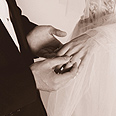
Disgust with religious coercion?
Photo: CD Bank
Why would someone want an egalitarian wedding? The question is essentially similar to asking why women really need higher education.
Rabbi Dr. Dalia Sara Marx is a teacher at the Reform movement's Hebrew Union CollegeWhat do they need equal rights for? And why do they want rights to decide matters of their own bodies?
Other questions must be raised as well: Why would a young woman agree to enter the covenant of marriage via a ceremony in which she has no voice, and her presence can be compared to the lovely flowers on the table?
Why would a groom, looking to forge a relationship of partnership and reciprocity, want to participate in a process that leaves his wife-to-be passive and virtually absent on the day of their wedding?
Why would a young couple what to mark the day on which they commit themselves to one another with a ceremony that stands in opposition to the values they want to base their relationship and their marriage on?
More and more women, educated to believe they are capable of accomplishing any goal and used to having the opportunity to pursue those goals, are refusing to accept a "absent-presence" on their wedding days.
Growing demand
There is a growing demand for wedding ceremonies that connect between this moving personal moment in which they formalize their relationship and their desire to feel connected on the day of their marriage to the Jewish people, its symbols and ceremonies.
Even Orthodox organizations are now trying to forge a path that would allow couples to marry in a way that would be more meaningful for them.
All this points to the fact that the question is no longer whether or not to create more egalitarian wedding ceremonies, but how to make this option available to couples looking to get married.
Egalitarian weddings
An egalitarian wedding would feature a bride reciting the same formula traditionally recited by a groom: You are hereby betrothed to me according to the laws of Moses and Israel."
An egalitarian wedding could be conducted by a female rabbi, and women could serve as witnesses. The ketuba, or wedding contract, would be written by the couple together, and the officiating rabbi, male or female, would bear witness to the couples reciprocal vows and to the values upon which they seek to establish their new home.
Many brides today are forced to lie their ways through the humiliating sessions at the chief rabbinate in which they are forced to nod their heads in agreement while being lectured/threatened on the subject of the laws of family purity.
Many detest the foul jokes heard when an officiating rabbi refers to a bride as a "pure virgin" when reading the text of the ketuba, part of the Orthodox ceremony. They are disgusted when he reads out the sum for which the bride has been purchased, and they are disgusted at being forced to comply with a ritual – worthwhile in-and-of-itself, but badly in need of updating.
No real answers
If this disgust with religious coercion was the main point here, many couples would forego religious weddings altogether. The fact that many young couples want egalitarian religious weddings is proof of their deep commitment to tradition, and to the eternity of the Jewish people.
Well-meaning Orthodox rabbis wanting to provide young couples with a "friendlier" ceremony have no solution for the problem, because they do not give the bride any real place (brides are permitted to present their grooms with a "present" following the conclusion of the official wedding ceremony).
On the other hand, secular lawyers and wedding celebrants who give couples the option of bypassing the cold, wanton religious establishment have no real answer for those wanting a marriage ceremony in accordance with their inner social and cultural values, but also want a connection with the ancient tradition of Jewish marriage ceremonies.
More than one way
People looking to build a marriage on these two strong pillars are no longer prepared to forego either one. Therefore, in recent years more and more young couples are choosing egalitarian weddings. They are prepared to travel overseas to register their marriages civilly so that their vows will be recognized by the State of Israel.
Thus, they show that there is more than one way to be Jewish. If couples cannot get married in a way that reflects both their Judaism and their values, they will be forced to choose: either they will forego a Jewish wedding and make due with a civil registry, or they will get married in an Orthodox ceremony that will be devoid of any real meaning.
Therefore, there is a great need for an egalitarian Jewish marriage option, recognized by the State of Israel.















